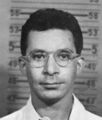Template:On This Day (nonfiction)/May 21
1471: Painter, engraver, and mathematician Albrecht Dürer born. Dürer will be regarded as the greatest German Renaissance artist: his vast body of work will include altarpieces and religious works, numerous portraits and self-portraits, and copper engravings.
1670: Astronomer and physicist Niccolò Zucchi dies. He published works on astronomy, optics, mechanics, and magnetism.
1686: Scientist, inventor, and politician Otto von Guericke dies. Von Guericke pioneered the physics of vacuums, and discovered an experimental method for demonstrating electrostatic repulsion.
1923: Mathematician and academic Armand Borel born. He will work in algebraic topology, and in the theory of Lie groups, contributing to the creation of the contemporary theory of linear algebraic groups.
1927: Charles Lindbergh touches down at Le Bourget Field in Paris, completing the world's first solo nonstop flight across the Atlantic Ocean.
1932: Amelia Earhart completes her solo nonstop flight across the Atlantic when bad weather forces her to land in Derry, Northern Ireland, after a flight lasting 14 hours, 56 minutes. Earhart is the second person (after Charles Lindbergh) to fly nonstop and alone across the Atlantic.
1946: Physicist Louis Slotin is fatally irradiated in a criticality incident during an experiment with the so-called "demon core" at Los Alamos National Laboratory.
1953: Logician and mathematician Ernst Friedrich Ferdinand Zermelo dies. His work had major implications for the foundations of mathematics; he is known for his role in developing Zermelo–Fraenkel axiomatic set theory, and for his proof of the well-ordering theorem.








